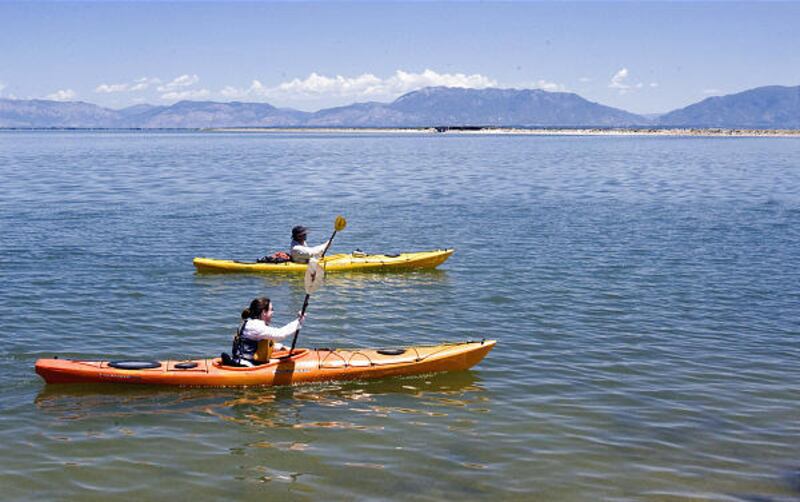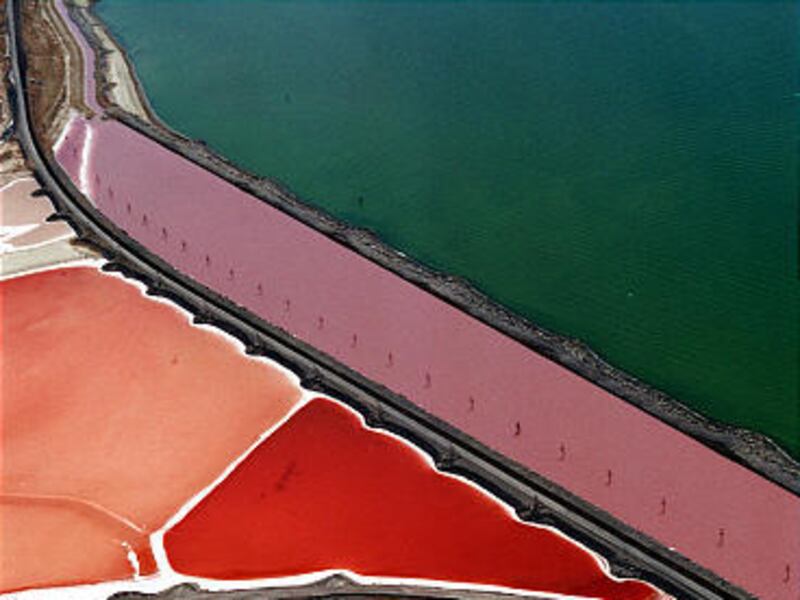Genevieve Atwood invites the comparison to a modern-day Cassandra.
Believing she's glimpsed the Great Salt Lake's future, Atwood has been stirred to action. But unlike the mythical Greek prophetess, she cautions that the alarm she's sounding mustn't fall on deaf ears.
Atwood's motivation has been the politically charged application process by Great Salt Lake Minerals to expand operations significantly in both the northwestern and northeastern arms of the lake.
If given its way, GSL Minerals, a subsidiary of Compass Minerals of Overland Park, Kan., intends to add thousands of acres of channels, dikes and solar evaporation ponds to meet growing worldwide demand for its organic sulfate of potash fertilizer.
Atwood believes a proposed expansion of this magnitude is shortsighted given that no one fully knows what the long-range implications are for the lake. "GSL Minerals expansion isn't just hurting the lake, it's hurting the function of good government," Atwood said.
"The lake is a poorly understood resource that is both valuable and vulnerable. But it isn't currently being aggressively managed based on science or sustainability," warns the scientist, educator and politician who now adds soothsayer to her lengthy resume of public service. "To continue on the course we're on would be unfortunate."
From an earth science perspective, the Great Salt Lake is a rough-hewn jewel. It provides some of North America's finest bird habitat as well as playing a big role in northern Utah's microclimate responsible for producing some of the "greatest snow on Earth."
From an economics standpoint, the lake is a cash cow, currently contributing millions annually to the state's coffers in sales tax, fees and royalties associated from mineral extraction and harvesting brine shrimp eggs.
"I have multiple levels of anxiety over management of the lake," explains Atwood, who held division head status as the state geologist for both Govs. Scott Matheson and Norm Bangerter. "I haven't felt the lake is being managed in the public's interest."
Perspectives
It might come down to perspectives. Don Leonard, president of the Utah Artemia Association, representing the interests of Utah's brine shrimp industry, said there has been — and will continue to be — positive ongoing dialogue among various lake interests.
Leonard, whose ties to the Great Salt Lake run deep as a lifelong Davis County resident, said his industry enjoys excellent relations with conservation groups, user groups and governmental overseers of the lake and he sees no reason for that to change.
He also expresses high hopes that recommendations made by the Great Salt Lake Advisory Council, on which he currently serves, will lead to the creation of a permanent Great Salt Lake Commission that will help guide future lake management. The 12-member advisory council, made up of many of the lake's diverse interest groups, was appointed by Gov. Jon Huntsman Jr. last August.
"The advisory council made significant progress — along a broad consensus — on a future vision for the lake. I think the merits will be seen and something accomplished," Leonard said, explaining the group's recommendations, based on evaluating the long-term viability of the lake and its entire ecosystem, must still pass muster with the governor and Legislature.
Friends of the Great Salt Lake director Lynn de Freitas, another advisory council member, is keeping her fingers crossed that the recommendations emerging from the gubernatorial and legislative crucibles "will look very much like what left our hands." Paramount, she believes, is the need to create a Great Salt Lake commission that can act in an advisory capacity.
Atwood gives gold stars to the advisory council for its work and considers the governor's decision to assemble the panel in the first place as evidence that he, for one, thinks the status quo regarding lake management needs to change.
At the same time she worries the council's recommendations risk being watered down or ignored in the power vacuum following Huntsman's announcement that he is leaving office to become U.S. ambassador to China.
"I personally might not be, but I believe a lot of people are very happy with the present management of the lake or lack thereof," Atwood said.
Leonard is urging everyone to let the process play out before rushing to judgment.
Unwise steward
Atwood lost faith in the Division of Forestry, Fire and State Lands' ability to protect and preserve the lake early on in the GSL Minerals expansion process. Her frustrations and concerns about current and future governance of the Great Salt Lake led to her to resign recently from the DFFSL's advisory council. DFFSL, by statute, has stewardship over Utah's sovereign lands made up primarily of the beds and banks of the state's navigable waters, including the Great Salt Lake.
She calls DFFSL as a "well-meaning" but "ineffective" manager of the lake, suggesting its staff is stretched thin and too focused on its firefighting duties to manage the sovereign lands under its jurisdiction properly.
"Lack of staff doesn't just lead to negligence," Atwood said. "But it leads to decisions contrary to the public in terms of process and outcomes."
Dick Buehler, Utah state forester and DFFSL director, finds Atwood's accusations perplexing. "A lot more people than just Genevieve are interested in the same things (correct management of the lake)," he said.
"DFFSL has been a resource management agency for years and years. We're not just a fire agency. We do fight fires in the summer. That's part of the job," he said, likening DFFSL's mission to the U.S. Forest Service and Bureau of Land Management, which despite seasonal firefighting responsibilities remain land managers first and foremost.
Nor does he think office staffing is causing sovereign lands to be shortchanged. "I've got three full-time and three part-time people in my office who wake up every morning thinking about sovereign lands management," Buehler said, adding that DFFSL just awarded $200,000 in research grants for management of the Great Salt Lake ecosystem.
Buehler said other resources at his disposal are the Great Salt Lake technical team as well as the ability to draw on the expertise of other state agencies with just a phone or office call.
Champion needed
Atwood is unconvinced. "If you're a wise steward do you really want to find yourself in such a state of crisis that you need an Obama approach to solve the problem?" asked Atwood, firing another broadside DFFSL's way. "The Great Salt Lake — actually all of the state's sovereign lands — needs a champion."
Atwood has a vocal ally in like-minded de Freitas, who complains DFFSL has an abysmal batting average as the lake's keeper.
"We're looking at the remnants of an ecosystem (Lake Bonneville) that has been around since the Pleistocene Age," de Freitas said, wondering aloud if there shouldn't there be a plan in place at the state level to perpetuate that legacy. Rather, she said, her experience has been that management of the Great Salt Lake and other sovereign lands is just an afterthought for DFFSL.
Buehler counters that such a blueprint exists: the Great Salt Lake Comprehensive Management Plan, which is being closely followed by his office.
"We have a management plan in place. The plan is a mandate for management of the lake regardless of the agency," he said, adding that the decade-old plan is due for an update soon.
Here is finally something he and de Freitas can agree on. She said the lake's comprehensive management plan badly needs revising so that it reflects new realities that weren't even on radar 10 years ago, such as levels of mercury, selenium and nutrients. Yet another reason, she proposes, to take it slow on GSL Minerals' expansion request.
Unintended outcome
If GSL Minerals' plan reaches fruition, Atwood said, it could have unintended consequences of potentially raising the lake's salinity or lowering the overall lake level below recent drought levels.
Sportsmen, birders and environmentalists alike are also on record questioning if the lake's already fragile ecosystem might be irreversibly damaged by the expansion.
GSL Minerals reportedly wants to withdraw up to 353,000 acre-feet of water from the lake for use in its evaporation ponds, according to de Freitas. That, in and of itself, has the potential of dropping the lake 2-3 additional feet from current levels.
How can that be justified, she said, looking at climate change trends predicting periods of sustained drought for the West.
"(DFFSL) didn't do its homework, de Freitas complains. "It didn't do proper analysis."
War of rhetoric
Both sides of the issue appear to be digging in in preparation for a long battle of words and legal briefs.
Says de Freitas, "This is make or break for the sustainability of the ecosystem." She calls it "unconscionable" that a state agency, acting on behalf of the public trust, is supporting industrialization of the lake; that the interests of one mineral company are being put ahead of the state's interests.
"The public needs to understand that creating more jobs and more fertilizer isn't the best answer for the state," de Freitas said. "Rather give the lake its due and we'll be ahead in the long run."
GSL Minerals spokesman Dave Hyams said the doomsayers are entitled to their opinions, but the process is being correctly followed and the leases granted by the state to the company are suitable for mineral activity as prescribed in the Great Salt Lake master plan.
"The (pending) environmental impact process," Hyams said, "will be the proper place to weigh concerns about the environmental impacts of the proposed evaporation ponds."
He said it's also important for the public to understand that the expansion, which upon completion, will bring a total of 75,000 new acres into production. Implementation, however, will come in stages, not all at once.
GSL Minerals press materials indicate the expansion could eventually double the current $5 million GSL Minerals now pays in property taxes and mineral royalties to the state and add 70 full-time jobs. The company currently has 330 employees.Atwood has also raised constitutional concerns over DFFSL's role in an unrelated proposed public/private swap of Division of Wildlife Resources land in the southern end of the Salt Lake Valley for a UTA/FrontRunner train station.
Buehler says Atwood is mistaken. "Everything this division has done has been by statute," he said. The lands she is questioning are not sovereign lands but lands DFFSL is managing. Nearby lands along the Jordan River are sovereign lands, however.
He said the UTA/Frontrunner decision is out of the division's control. "It will be a political decision and will be made at the governor's direction."
Atwood's letter of resignation dated April 6 indicates her belief that the advisory council she was serving on had only limited powers and scope.
"I continue to have grave reservations that the advisory council gives the public an impression that (it) observes, understands, examines, and endorses priorities of the division when, in fact, the advisory council by statute has no authority other than to give advice, and by practice is not called upon by the division to provide oversight or even much advice," she wrote. "I have worried that by serving on the council, I do more harm than good, but have rationalized the situation by hoping to change matters."
E-mail: chuck@desnews.com



